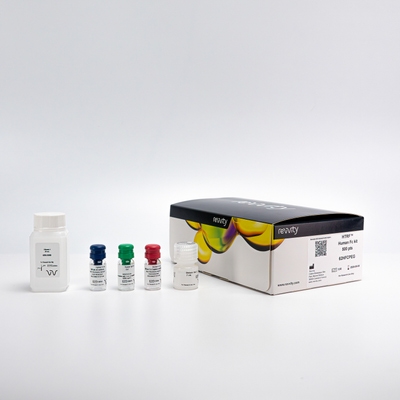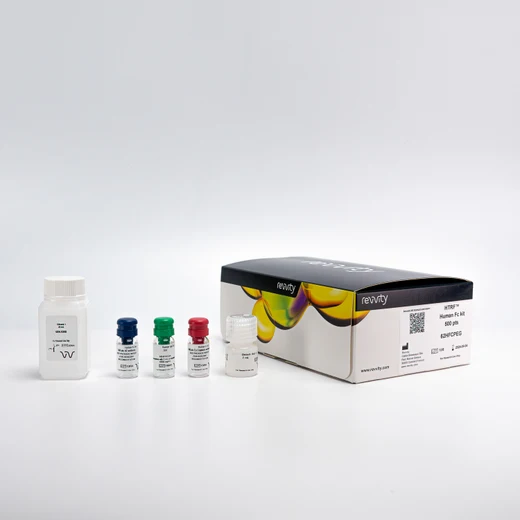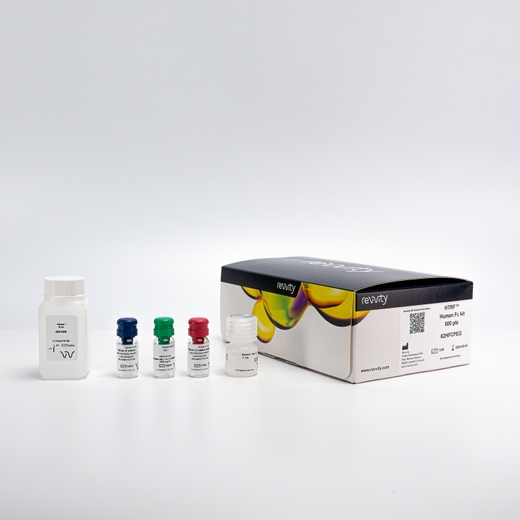

HTRF Human IgG-Fc Detection Kit, 500 Assay Points


HTRF Human IgG-Fc Detection Kit, 500 Assay Points






The Human Fc kit is designed for the fast quantification of human IgG or Human Fc tagged proteins.
| Feature | Specification |
|---|---|
| Application | Protein Quantification |
| Sample Volume | 10 µL |
The Human Fc kit is designed for the fast quantification of human IgG or Human Fc tagged proteins.



HTRF Human IgG-Fc Detection Kit, 500 Assay Points



HTRF Human IgG-Fc Detection Kit, 500 Assay Points



Product information
Overview
Drug discovery and bioprocess often require accurate quantification technologies to improve the productivity workflow. Current methods such as ELISA do not properly fit with such objectives as they require multiple sample-handling and protocol steps. The human Fc kit enables a rapid quantification of human IgG, and any proteins containing a human Fc region. The assay is compatible with natural IgG as well as recombinant antibodies.
Specifications
| Application |
Protein Quantification
|
|---|---|
| Brand |
HTRF
|
| Detection Modality |
HTRF
|
| Product Group |
Kit
|
| Sample Volume |
10 µL
|
| Shipping Conditions |
Shipped Ambient
|
| Target Class |
Biologics
|
| Target Species |
Human
|
| Technology |
TR-FRET
|
| Therapeutic Area |
Cardiovascular
Infectious Diseases
Metabolism/Diabetes
NASH/Fibrosis
Neuroscience
Rare Diseases
|
| Unit Size |
500 Assay Points
|
Video gallery

HTRF Human IgG-Fc Detection Kit, 500 Assay Points

HTRF Human IgG-Fc Detection Kit, 500 Assay Points

How it works
Assay principle
The human Fc kit is a competitive immunoassay for the measurement of hIgGs or any hFc-tagged proteins in a range of biological materials. The assay uses an Eu3+-Cryptate conjugated antibody specific to hFc and d2 coupled hIgGs. hFc provided by the sample competes with d2-labeled human IgG for binding to anti-human Fc Eu Cryptate.

Assay Protocol
The human Fc assay features a streamlined protocol with only 1 incubation step after sample and Human Fc detection reagents dispensing. This protocol requires a single 2-and-a-half-hour incubation period at RT.

Assay details
Key features
| Detection limit: | 9 ng/mL |
|---|---|
| Dynamic range: | 5.5 to 4,000 ng/mL |
| Incubation time: | 2h30 to ON |
| EC50: | 216 - 296 ng/mL |

Assay validation
Whole hIgG and Fc fragment detection
Human Fc chimeric antibodies as well as proteins containing a human Fc region can be detected using the HTRF human Fc assay. As shown in Figure 1, the affinity depends on the nature of each Fc chimera and is at its maximum for whole IgG. This means that the assessment of the concentration can be made on a relative basis using the human IgG calibrator. Absolute concentration can be approached if the calibrator is made with the same protein as that being assessed.
Figure 1: Various concentrations of four different human Fc chimeras were tested using the Total human IgG assay, following standard assay protocols.

Media compatibility
Figure 2 demonstrates the compatibility of the HTRF human Fc assay with different media, even in the presence of 10% FCS. No impact on assay performance was seen. Unlike other immunoassays involving streptavidin-biotin detection, this assay is insensitive to the presence of culture medium, whose quenching effects can be compensated for by our patented 665/620 ratio.
Figure 2: IgG standard curve was drawn up using IgG in phosphate buffer, culture media and RPMI containing 10% FCS+/- 4.4% PSGHT (Penicillin, Streptamycin, Glutamine, Hypoxanthine, Thymidine).

Resources
Are you looking for resources, click on the resource type to explore further.
Discover the versatility and precision of Homogeneous Time-Resolved Fluorescence (HTRF) technology. Our HTRF portfolio offers a...
This guide provides you an overview of HTRF applications in several therapeutic areas.


How can we help you?
We are here to answer your questions.






























